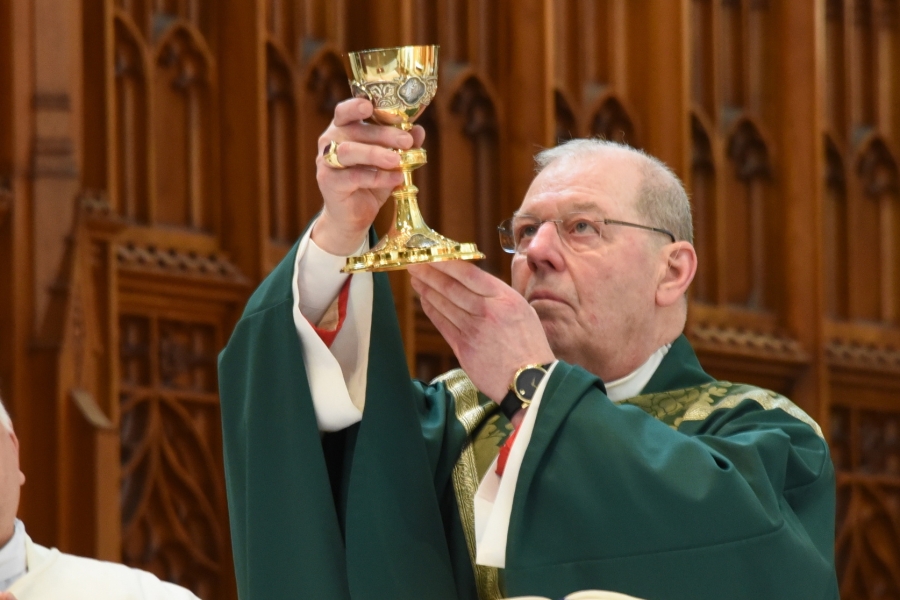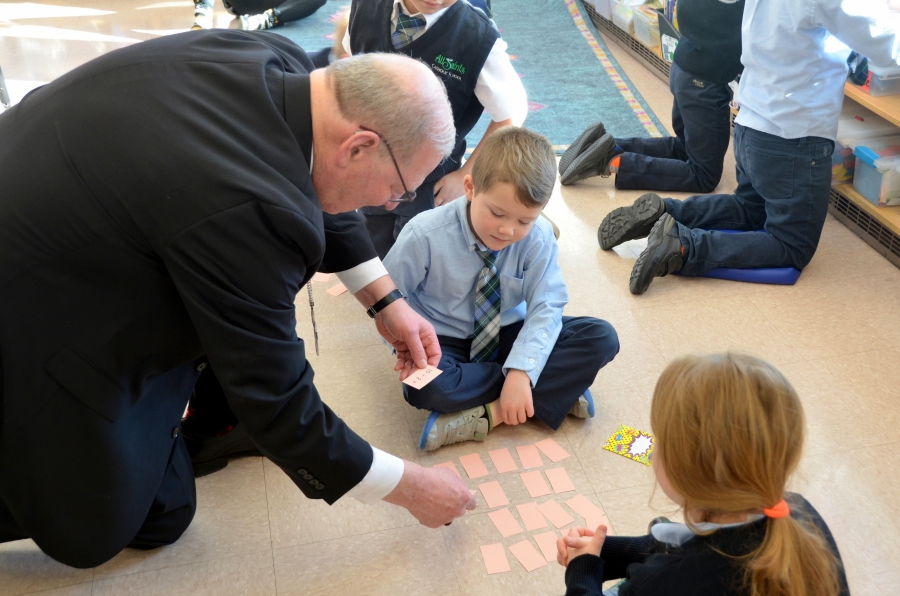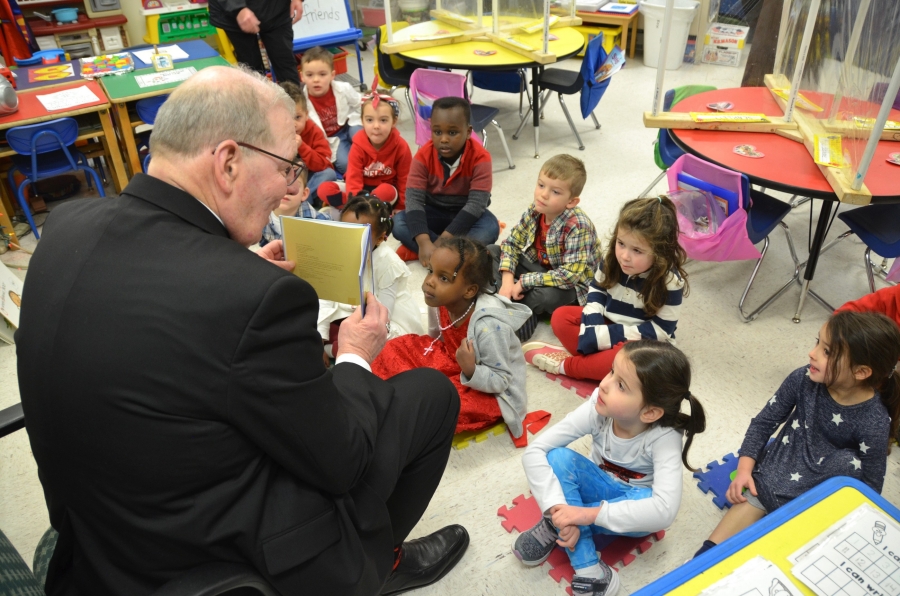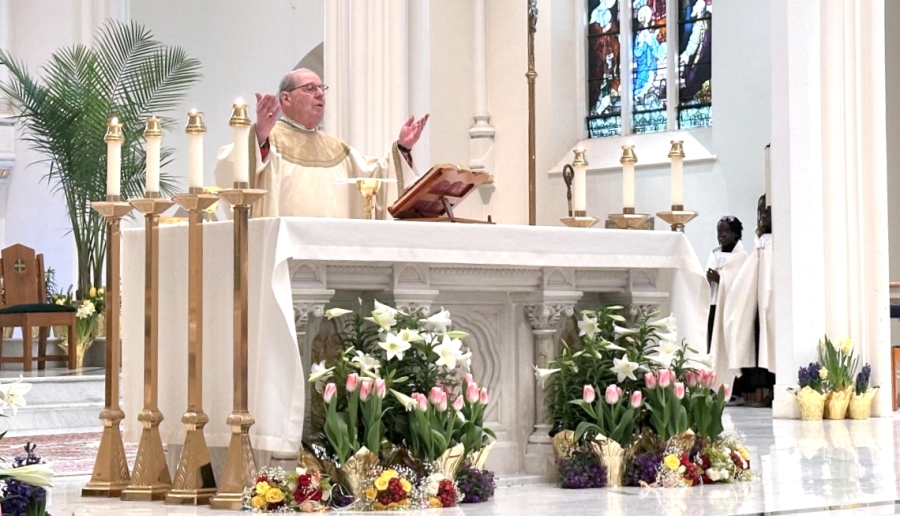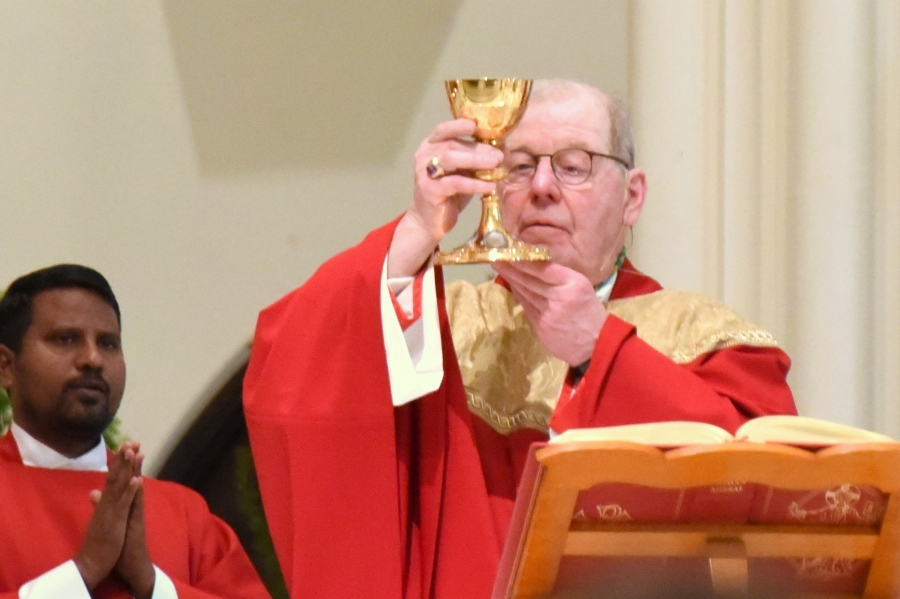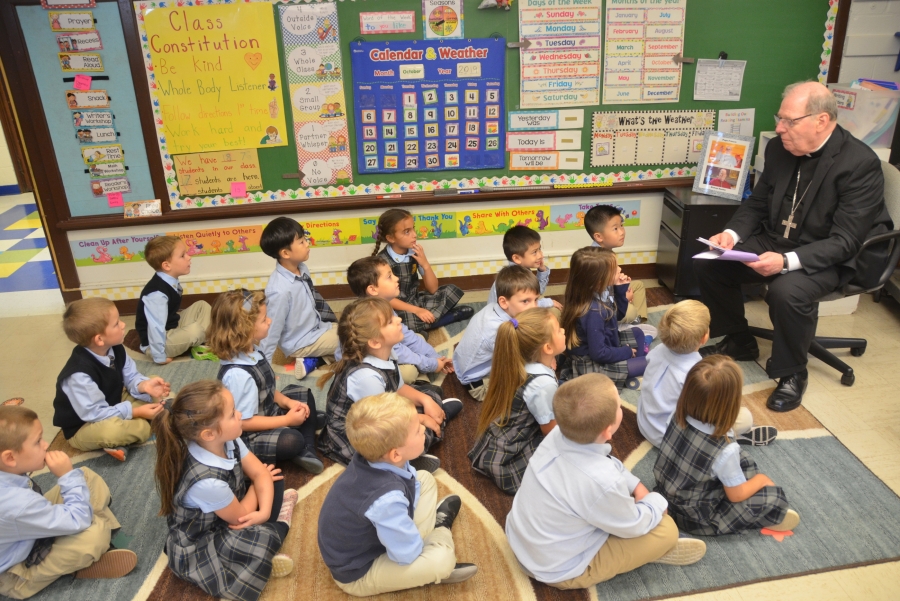Remembering times of grace and challenge
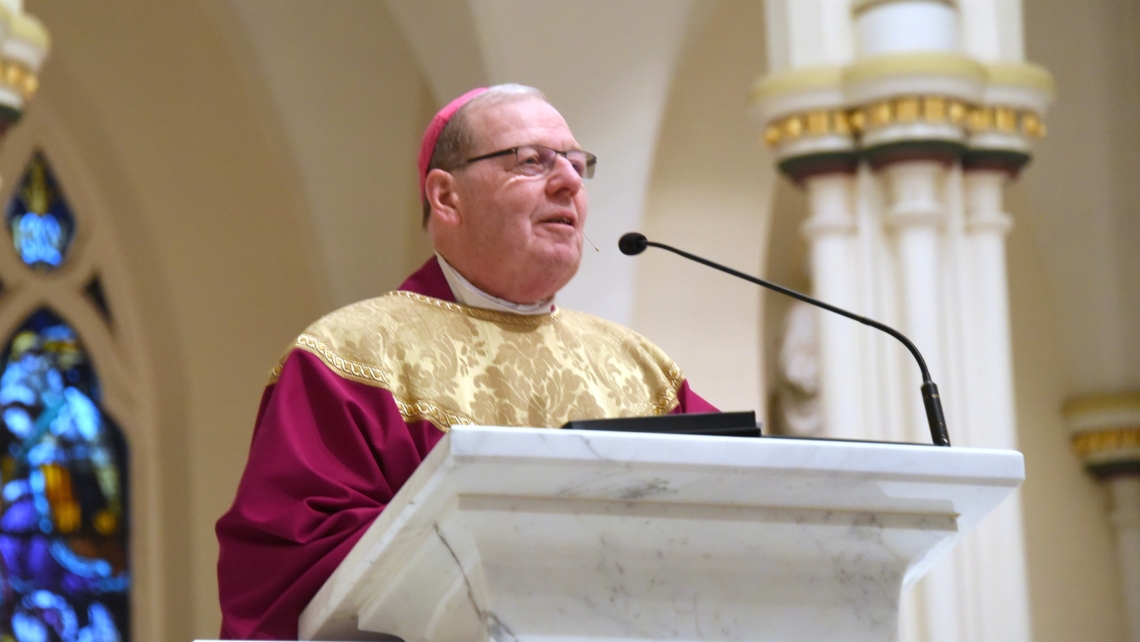
Bishop Robert Deeley has held a lot of positions in his more than 50 years of ordained ministry. He’s been a pastor. He served as judicial vicar and later as moderator of the curia, vicar general, and auxiliary bishop for the Archdiocese of Boston. He served at the Vatican. He was president of the Canon Law Society of America. But with all he has done, he says nothing can compare to the years that he spent as bishop of the Diocese of Portland.
“I’ve done a lot of different things in priesthood through the years: administrative, pastoral, spiritual, educational, all kinds of things, but nothing as great as being the bishop of the diocese and being at the heart of the diocese, recognizing that we’re building a community that reflects the love of God and is spreading the love of God. I think that has been a marvelous privilege,” he says.
When he was installed as bishop on February 14, 2014, he says he thought he would serve for about nine years, a couple years beyond the age of 75 when bishops are required to submit their retirement letters to the pope. Instead, he served more than 10.
“They have been very happy years. When you are content and happy with what you’re doing, you don’t see the time going by. It’s hard to believe that 10 years have run by,” he says.
Bishop Deeley says his time as chief shepherd has been filled with both graces and challenges. He says he discovered one of the graces not long after his installation when visited with priests, seeking to learn more about them and about the diocese.
“My responsibility as bishop was to be pastor of the priests who then pastor to the people, and I realized early on in those visits that the priests would be a joy to work with,” he says. “They were genuinely interested in what was happening in the Church and what could happen in the Church.”
Bishop Deeley says that commitment remained strong throughout his episcopacy even as the number of priests declined.
“When I called somebody to change an assignment there were very few instances in my 10 years that anyone said to me, ‘I don’t want to go there.’ And in those few occasions, they tended to have reasons why they didn’t think it was a good fit for them, so I think we are very blessed with our priests and their generosity,” he says.
That includes the international priests now serving in the diocese. Ten years ago, there were only a handful of priests who were not native Mainers. Now, they comprise more than half the priests serving at parishes. The partnerships that have brought priests here from India and African nations have been invaluable.
“It’s a real blessing. We’ve been able to continue to offer the Mass throughout the diocese, in this spread-out territory because of the international priests. We would not be able to do it without them,” he says. “The generosity of these priests is remarkable, and their kindness is tremendous.”
Bishop Deeley says another grace has been the commitment of the lay faithful to reach out to those in their communities. He points to food ministries, such as the St. Vincent de Paul Soup Kitchen in Portland, and to the work of Catholic Charities Maine, the charitable arm of the Church.
“We care for people, and we show the love of Christ to people, whatever their religious background. As the saying goes, we don’t do it because they’re Catholic but because we’re Catholic. I think that’s important,” Bishop Deeley says. “We believe that the worth of each person requires us to care for them in the same way that God cares for them because each of us is created in the image and likeness of God. That is the foundational statement of Catholic social teaching, and it applies from conception to natural death. It is the reality of how we live.”
And of how Christ has called us to live.
“Charity is not just caring for other people; it’s doing it because I believe I have been loved by God and I want to share that love. That is where the faith commitment comes in. I know that God created me out of love, through the instrument of my parents, and as such, I am called to pass that on,” Bishop Deeley says. “Love God and love your neighbor is what Jesus tells us to do.”
Bishop Deeley says the National Eucharistic Revival, aimed at helping people experience a more profound encounter with Jesus, is another grace that has occurred during his episcopacy. The revival began in 2022 and will conclude on the Feast of Pentecost in 2025.
“That is absolutely one of the graces of the Church today. It is a good reminder to us of what the Eucharist is, the risen Lord present to each one of us. When I’m with children, I tell them that He is as present to us today as He was to the apostles after His resurrection. That is a powerful statement, but it is true,” Bishop Deeley says. “Why do I believe that? Because He told us.”
Bishop Deeley says the time he has spent with children, either while visiting parishes or the diocese’s Catholic schools, have been among the most enjoyable for him because he says that we are all children at heart.
“The enthusiasm of the children is overwhelming. It’s just a beautiful, beautiful thing, and the questions that they ask are simple questions because they live in a black and white world. Abstraction is not part of their thinking,” he says. “You think to yourself that this is what the Lord wants us to be like. He wants us to be filled with joy at what’s going on in life, with life’s simplest things. The children are all so happy. You read a story and they think it’s wonderful. They’ve heard the story 15 times, and they still love it.”
He worries, however, about how children were impacted by the COVID-19 pandemic, pointing to that as among the challenges of the past 10 years. He says even now it’s hard to discern whether the right steps were taken.
“We took care of physical health, but we didn’t give as much attention to psychological and spiritual help, which are all parts of who we are, so COVID was a major challenge,” he says.
During the height of the pandemic, Catholic churches in the state were not open to the public for fear of endangering people’s physical health. However, the bishop says he is not sure that he would make that same decision today because of all that was lost.
“We can’t isolate ourselves as individuals. We live in community. The beauty of Christianity is that it structures our way of being together, and at the heart of Christianity is relationship, a relationship with God who is a relationship. He invites us into that relationship out of love and for love, and then, we in turn, becoming part of that relationship, have a relationship with each other of love, care, concern, and willing the good of the other,” he says.
The pandemic resulted in a drop in the number of people attending Mass, and while there are hopeful signs, such as the number of new Catholics entering the Church this year, attendance has not yet returned to pre-pandemic levels.
While concern over COVID is beginning to wane, Bishop Deeley says one of the greatest challenges still facing the Church is the harm caused by clerical sexual abuse. While there hasn’t been a substantiated allegation of such abuse in the diocese in more than 30 years, the bishop stressed the need for continued vigilance and continued outreach to those who suffered harm. During his time as bishop, he met with victims/survivors, and he spoke publicly about the harm caused by the abuse and apologized on behalf of the church. The diocese also offered counseling, as it continues to do, to anyone who feels that he or she has been hurt by clergy sexual abuse.
“It is a hurtful thing. It’s a reality that should never have happened,” he says. “We can’t just make it go away because we want it to go away. We need to deal with it and reach out to the people who have been hurt. We need to try to help them heal.”
He says issues surrounding clergy sexual abuse, a related pending court decision, the pandemic, a society that has become more individualistic and contentious, and the priest shortage have left the diocese at a crossroads, but he says, as he has done whenever facing adversity, he puts his trust in the Lord.
“The Lord has told us that He rose from the dead in order to assure us that good will triumph over evil, so in the end, good will win because God will win. We may not see that happening, but that is the way we need to live. We need to live in hope. We need to believe what God has spoken to us,” he says.
Those who have served with Bishop Deeley over the past 10 years say that hope-filled approach is what has made him a good shepherd to both priests and parishioners.
“He is a man of hope and spent his time with us here in Maine inspiring hope,” says Sister Rita-Mae Bissonnette, RSR, chancellor. “He was also a man of gratitude. He was always so thankful to everyone for even the slightest thing. He was always saying thank you in letters. He diligently responded to all who wrote to him with gratitude, encouragement, and frank and honest replies.”
Bishop Deeley loved being around people when he traveled around the diocese, often preferring to sit among them rather than apart from them at a parish dinner and lingering until the plates were being cleared.
“Wherever Bishop Deeley went — from Fort Kent to Kittery and from Oquossoc to Machias (the number of miles he traveled in service to the people of our diocese is probably some sort of record) — this good shepherd enthusiastically encountered and engaged the sheep of his flock. Whether these communities were large, small, or somewhere in between, he marveled at the authenticity of their faith, their self-sufficiency in caring for the local Church, and their genuine hospitality,” says Msgr. Andrew Dubois, pastor of St. Paul the Apostle Parish, who formerly served as moderator of the curia and vicar general.
“I have always been impressed with the work ethic and stamina of Bishop Deeley. He really embraced the diocese and its size and seemed to be everywhere,” says Father Daniel Greenleaf, pastor of Prince of Peace Parish in Lewiston. “He always seemed to delight in being around parishioners.”
“I take great joy in what I do and in the ministry that I do,” Bishop Deeley says. “The kindness of people and my conversations with people, learning from them how God has touched their lives, those things are just beautiful.”
During his episcopacy, Bishop Deeley sought to help parishioners become more engaged in the life of the Church, working with the Catholic Leadership Institute to help clergy, religious, and lay leaders strengthen their church communities.
“Working with the Catholic Leadership Institute was an enterprise to help everyone understand that we are on the same journey, that we had the same responsibilities, and that we need to work together to solve the problems that we have and to bring the Gospel to the whole diocese,” Bishop Deeley says.
“When Bishop Deeley arrived, he applauded our efforts to ‘right-size’ our day-to-day operations, and then he helped us move from an administrative to a ministerial focus by introducing a pastoral planning process by which parishes would establish priorities and goals for more effective evangelization through dignified worship, faithful catechesis, and compassionate outreach. While acknowledging the challenges before us, I’ve always appreciated that he encouraged planning for growth rather than diminishment. Even before Pope France called for it, Bishop Deeley was inviting us to practice synodality,” says Msgr. Dubois.
Bishop Deeley says he hasn’t given a lot of thought to the future but says he is hoping to spend more time with friends and says he does plan to remain in Maine.
“I never thought of going back to Boston, even from the beginning, because my experience with bishops was that they stayed wherever they went,” he says. “The ring, you remember, is a symbol of the relationship between the bishop and the diocese.”
And he says he likes living here.
“I like the people. I think it’s a beautiful place. And I think I have enough energy to be of help to Bishop Ruggieri as he needs it,” he says.
He will also continue to serve on some committees, including the U.S. Bishop’s Canonical Affairs and Church Governance Committee. But he says, overall, he plans to take things a little more slowly.
“I am hoping to move around the state now in a little bit less of a hurried fashion, so I get to see some of the stuff that I flew by at 75 mph,” he says. “I think there is something good about slowing down the pace of life a little bit.”







